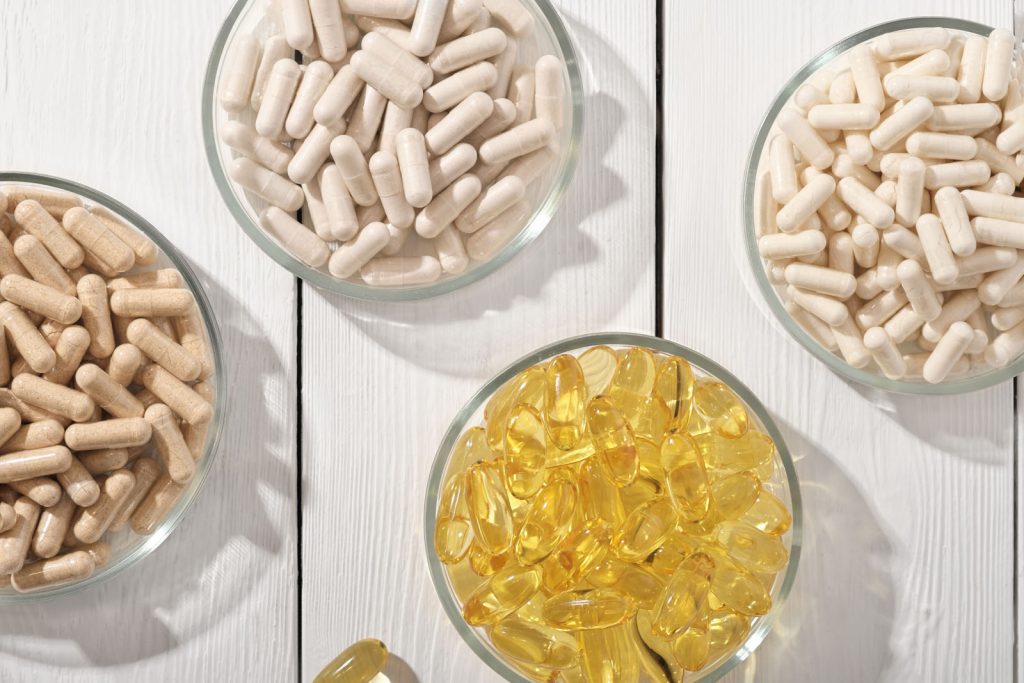Discover evidence-based natural options to help men manage gastritis. Get expert tips on alleviating gastritis symptoms and improving your gut health.
Managing Gastritis Naturally: A Guide for Australian Men

Key Takeaways
- Gastritis is inflammation of the stomach lining- and a common issue for Aussie men.
- Symptoms include stomach pain, nausea, burning and bloating.
- Gastritis can have many causes including stress, poor sleep, gut microbiome imbalance, and infections like H. pylori.
- Chronic gastritis can lead to peptic ulcer disease and stomach cancer if not addressed.
- Pharmaceuticals like PPI's reduce symptoms but have long-term side effects including impaired digestion and nutrient absorption.
- Natural treatments can include dietary changes, herbal medicine, and nutritional support including vitamin C & riboflavin. Item
- Treatment should be individualised with proper testing to determine the root cause of gastritis for more than just symptom control.
Introduction
Gastritis is a common issue amongst Australian men which often remains undiagnosed and treated for longer than it should. If asked to describe gastritis in simple terms, I would explain it as inflammation of lining of the stomach. Layers of specialised cells and tissues form a protective lining in the stomach, all of which can normally withstand the strong digestive acids needed to break down food. Although stomach acid is required for digestion, when this protective lining is impaired or inflamed the exposure to gastric acids can cause uncomfortable symptoms. These symptoms include stomach pain, digestive discomfort, loss of appetite, and nausea.
There are different types of gastritis, including chronic, acute, autoimmune and chemically-induced gastritis. Many factors play a causative role in gastritis, so taking a thorough health history is crucial for achieving long-term symptom resolution, rather than just reducing the stomach acid your body needs!
Men's Health: Gastritis Statistics
Gastritis is a predominantly male issue, with a huge 73 percent of all cases affecting men! Older adults and those who consume alcohol are at higher risk of gastritis- however, in clinic we see men of all ages and from all walks of life with gastritis.
Long-term inflammation and damage to the tissues of the stomach lining can cause changes in the cells. Some types of gastritis, (particularly atrophic gastritis) can raise the risk of stomach cancer– which is why early detection and correct management are important.
Common Symptoms of Gastritis
Nausea, stomach pain and discomfort, and loss of appetite are common symptoms of gastritis. Another common sign of gastritis is a burning feeling in the upper abdomen which often gets worse when the stomach is empty, or straight after eating. Men with gastritis may also vomit, experience bloating, or feel full quickly. Anyone experiencing these symptoms or any other unexplained digestive pain should seek advice from a healthcare professional.
GORD vs. Gastritis vs. Peptic Ulcer: What Is The Difference?
Gastritis, gastro-oesophageal reflux disease (GORD), and peptic ulcer disease (PUD) are different, but they often interplay and can cause similar symptoms.
GORD (which many call heartburn or acid reflux), is when stomach acid flows up into the oesophagus. This creates a burning feeling in the chest- a discomfort I am sure we have all experienced! The pain can be so extreme that GORD is often mistaken for a heart attack! GORD is a very common condition and I have written another article on this particular topic, which you can find here. In contrast, gastritis involves inflammation of the stomach lining rather than the oesophagus, leading to the symptoms we already discussed. When the stomach lining is compromised long-term gastritis can lead to peptic ulcer disease.
Peptic ulcer disease (PUD) refers to open sores that form in the lining of the stomach or duodenum (which is the first part of the intestines). As I mentioned, these ulcers can develop from chronic or untreated gastritis, or a H. pylori infection. Managing gastritis is critical to reduce the chance of PUD developing, but if you would like to know more about this particular condition you can read more about it in my article here.
To differentiate between all of these conditions, it is important to consider symptoms, medical history, and to test thoroughly.
What Is Gastritis? The Diagnosis
Gastritis is just a broad description of different categories of disease, which all have different contributing factors and causes- and therefore require different kinds of management. Types of gastritis include:
- Acute gastritis
- Chronic gastritis
- Autoimmmune gastritis
- Erosive or chemical gastritis
- Atrophic gastritis
- Chemical, radiation-induced (or reactive) gastritis
- Hypertrophic gastritis
- Lymphocytic gastritis
- Infectious or Eosinophilic gastritis
- Granulomatous gastritis
What Causes Gastritis?
Many things can upset the delicate balance of the stomach lining. Obvious contributors to this can include bacterial infections, irritants (food and drink), autoimmune responses and reflux. Other factors can include stress, sleep quality, eating habits, and gut health- they all alter how our cells function and our body reacts.
I cannot remember a time when a patient with gastritis only had digestive factors contributing to their condition. We take a thorough health history which considers all of the body systems and all of the possible contributing causes- from both the internal environment and external factors.
Stress, Poor Sleep, and Gastric Secretions
Stress is common in modern life. Research shows that stress can have an adverse effect on the gastrointestinal tract, which can includes increased gastric acid secretion and reduced production of protective mucus in the stomach. These changes can result in gastric inflammation, erosion and ulceration (otherwise known as gastritis and PUD!) Not only that, but studies have demonstrated that those with poorer sleeping habits and mental health are at greater risk of developing gastritis.
Long-term stress also affects our gut microbiome which supports digestive health and our immune systems. When the balance of the gut microbiome is disturbed, there is an increased risk of gastritis. An unhealthy gut microbiota can also be exacerbated by Helicobacter pylori (we will get to this specific bacteria next!). Not only that, but changes in the gut microbiome have also been associated with gastric carcinogenesis– the formation of stomach cancer cells.
But how can functional medicine help with stress? To help manage stress and the impact it has on physiological functioning, we use herbal and nutritional medicine to support your nervous system, or work with you on lifestyle adaptations to help you keep stress in check and support a healthy gut.

The H. Pylori Conundrum: To Treat or Not to Treat
A common cause of gastritis is Helicobacter pylori, which is a bacteria found in stomach lining of around 15% of the Australian population. H. pylori is a commensal bacteria. Commensal means they are microbes which naturally live in human body without (generally) causing harm. Instead, H. pylori often provides important benefits, such as digestive support, immune regulation, protection from other pathogenic microbes and enforcing the integrity of the gut barrier. To find out if someone has a H. pylori infection, doctors often use a breath or stool test.
Many people have H. pylori and experience no symptoms. In fact, eradication of H. pylori is many cases can actually cause significant negative side effects! But in other cases, H. pylori can cause inflammation and result in more serious problems such as ulcers and gastritis. Deciding whether to treat H. pylori can be tricky. The risks and benefits of treating the bacteria depends on personal factors, and also when the symptoms developed and how significant they are.
Diagnostic Procedures & Medication For Gastritis
So how is gastritis diagnosed? A GP will generally review a patient’s symptoms and medical history. Further investigations could include an endoscopy or biopsy. Stool and breath tests are used to identify Helicobacter pylori, and blood tests can reveal inflammation or infection markers. It is important to see a doctor for diagnosis of gastritis- we can provide you with a referral if you feel unsure where to go, or who to trust.
Gastritis is often treated with medications like proton-pump inhibitors which lower stomach acid to reduce the symptoms of gastritis, and to allow the irritation to heal with a less-acidic environment. However, this approach is only treating the symptoms and not the cause.
It’s also important to understand that using these drugs for a long time will impair your natural digestive process. Having less stomach acid will reduce your ability to digest food, slow down your bowel movements and make it difficult for your body to obtain the nutrients it needs from food. Then there are systemic side effects from nutrient deficiencies including microcytic and microcytic anaemia, reduced immune function and increased risk of colon cancer in cases of chronic constipation.
So, although pharmaceuticals can be effective for symptom relief, the side effects can lead to other digestive and health problems.
Natural Treatment for Gastritis
That’s why changes in diet and lifestyle are key in preventing and recovering from gastritis. There are simple ways to improve the health of your stomach lining, including simply eating more fruits and vegetables to provide your body with the antioxidants and nutrients it needs for healing. In the healing stage of gastritis, a bland diet might be recommended, including advice to avoid things like too much alcohol and fatty foods to help relieve your symptoms.
As I have explained, there a lot of contributing factors to gastritis- and because of this, there are a lot of different approaches to its treatment. Depending on a man’s health history, symptoms, and the root cause of gastritis a treatment plan could include a combination of herbal anti bacterials and anti-microbial, nervous system support, digestive enzymes, or herbs and nutrients to soothe the mucosa, reduce inflammation and promote healing of the lining of your stomach.
Next I’ll discuss some evidence-based treatment specifics that I commonly use with my gastritis patients.

Althaea officinalis radix: Natural Solutions for Gastritis
Althaea officinalis radix is the latin name for marshmallow root. Althaea is known for its ability to sooth tissues, and can be used for digestive irritation. This herb contains mucilage, which is a sticky substance that helps coat and protect the irritated tissue that is gastritis. Marshmallow root contains an assortment of antioxidants, which have an anti-inflammatory effect on the mucosa of the gastrointestinal tract. Althaea provides symptomatic relief from inflammation, and also helps with healing due to its mucoprotective nature.
We generally prescribe Althaea in a tincture form. Althaea officinalis radix is usually safe for most people, but we do recommend speaking to a health professional to avoid any side effects.
Natural Remedies for Gastritis- Vitamin C and Vitamin B2
Studies show that Vitamin C can help both prevent H. Pylori and support the eradication of H. Pylori infection in both gastritis and peptic ulcer disease. In patients with H. pylori-related chronic gastritis, high-dose vitamin C has been shown to inhibit the growth of the bacteria. We often prescribe liposomal vitamin C, but rich sources of dietary vitamin c include citrus fruits, berries, and leafy greens.
Riboflavin is essential for cell growth and repair. Vitamin B2 or riboflavin also has protective and preventative actions against gastric ulcer
formation and inflammation of the digestive mucus membranes. One particular study showed that riboflavin deficiency increases susceptibility to gastric ulcer formation, and also that riboflavin administration can provide protection from these lesions. Dietary sources of vitamin B2 include almonds, mushrooms, and dairy.
Herbs For Gastritis: Chamomile
Matricaria recutita is the latin name for chamomile. Chamomile has the most amazing array of evidence-based pharmacological actions which make it perfect for cases of gastritis. The chemical in constituents in Matricaria have anti-inflammatory action on skin and tissue layers. Studies also show that chamomile inhibits Helicobacter pylori.
The other therapeutic benefit of Matricaria recutita stems from the effect it has on the nervous system. Matricaria has been used for centuries to support sedation, sleep, and reduce anxiety and this is all now backed by science. Given the link between gastritis and stress, Matricaria recutita is a key herb in our clinic for symptom management and prevention of the recurrence of gastritis.
Other Natural Treatments For Gastritis
Other natural treatment protocols for gastritis include green tea. Studies have found that regularly drinking green tea was associated with a lower risk of both chronic gastritis and stomach cancer. Not only that, but green tea has been shown to demonstrate inhibitory action on H. pylori bacteria.
Due to the connection between gastritis and the health of the microbiota probiotics are another supplement we might consider. Using probiotics for Helicobacter pylori infection has been shown to reduce gastric mucosal inflammation and decrease the density of H. pylori in the mucosa. Not only that, probiotics use in combination with antimicrobials was found to significantly increase the eradication of antimicrobial resistant H. pylori.

Conclusion
To conclude, the treatment of gastritis is not a one-size-fits-all, but there are plenty of ways to reduce your risk and prevent the recurrence of gastritis. Stress, food habits, and lifestyle choices can all contribute to gastritis, so it’s important to take a full health history and consider all of the contributing factors to ensure you are getting to the root cause of the problem. By using some of the supplements I have recommended here, and supporting the health of your stomach lining with a good diet and the nutrients your body needs you can recover from gastritis.
Please remember that every man is different and we recommend asking a qualified natural health practitioner who is experienced in digestive disorders for advice that fits your needs.
Frequently Asked Questions
What are the first signs of gastritis I should be aware of?
Early signs of gastritis can include a burning or aching pain in the stomach or upper abdomen. You might also notice a loss of appetite, nausea, weight loss or vomiting.
Can stress cause gastritis symptoms?
Yes! Stress can both contribute to gastritis and also exacerbate gastritis symptoms worse.
Is it possible to completely heal from gastritis through diet and supplements?
Diet and supplements can help support mucosal health. However, in order to fully heal from gastritis, it is essential to know the causes of gastritis. In most situations, making lifestyle changes will play an important role in your recovery.
What should I do if I suspect H. Pylori infection?
If you think you might have H. pylori, chat to your doctor or functional medicine practitioner. We can refer you for a breath test or stool test to confirm the diagnosis.
How important is professional guidance in managing metabolic syndrome?
Getting help from a nutritionist or functional medicine practitioner is essential for managing metabolic syndrome. We can look at your personal risk factors and suggest tailored lifestyle changes. We also track your progress. This guidance can really help you stay on track while you make sustainable change!












